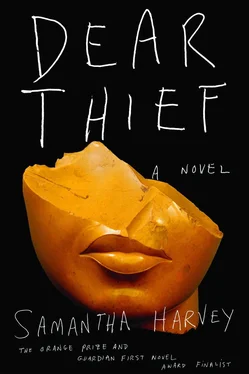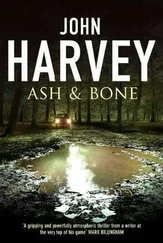He was going to say, in case you missed the nuance, that stars make him think about the holes of light that beamed through your shawl the day you arrived at our back door. He has made the observation more than once before. It is funny how deeply affected we can be by the smallest things that happen in childhood — I have no doubt he still sees you exactly as he did that day, raising your arms against the spring glare and growing wings. His vocabulary was limited more or less to nouns in animal picture books then, and I will always remember his glee at having a word for what he saw: butterfly! This great, dark-winged vision leaking light as if bullet-holed. Two decades later he still packs the truth of you into this vision etched on his one-year-old retina and thinks of you as eternally magical and light-shot, so that even the stars are first and foremost reminders of you.
Should I, his mother, disabuse him of this view? Should I say to him, Teddy, Butterfly is not quite the creature the name implies. Or should I let him see the good in you and have him run with this glorious vision he has: you with your head thrown back in laughter, you with a copy of the Upanishads quoting May we never hate one another while your eye gleams wickedly, you wrapped in the shawl and stoking the fire in the woods as the sun comes up, you in the dunes, negotiating and renegotiating your terms with every shifting grain of sand so that they allow you to make permanent home amongst them.
Am I being unfair? Perhaps you are a tender creature after all and perhaps Teddy’s notion is the truest. There are butterflies that survive winters. To be resilient is not always to be hard. If your nickname were purely ironic it would never have survived so long, surely, and you would have shrugged it off as you shrugged off everything that no longer suited you. I cannot say for sure that Teddy is wrong in his assessment, this is the thing, and so I let yet another subject go.
My own father once said that your children are beautiful to you in a way that nothing else is; as a girl I remember him telling me about my beauty as if he were outlining a profound fact, or setting out a singular truth. It was not a description, because that would suggest it was from his point of view; no, it was an explanation of my very particular beauty as known by him, the world expert on his subject. He knew something about me that I would never be able to know myself; he knew it because he was my parent and preceded me, and could see into all the voids from which I’d sprung. And as soon as I became a parent I could acquire that piercing vision and could know and see the same as my father had known and seen. It is such a steady love you feel for your child — bottomless and generous — and all afternoon I have missed Teddy, and every time he goes I miss him, as if each time he falls once and for all from the face of the Earth.
Somehow I feel fraudulent to have written most of the last few pages in January, after Teddy left the country, and to have made it sound like I was still referring to ‘yesterday’. In fact I went back to work on New Year’s Eve and haven’t had time for this letter since.
More than this, I am aware that I haven’t been completely truthful and I wonder why. How can it be that we can begin something wholeheartedly and slip, so quickly, into guarded omissions and liberties with the truth? Under the circumstances the goodness of human nature is very quick to buckle, don’t you think? But then, of course you agree, and you hardly need me to point it out.
So a dilemma arises: let’s say you lie in a letter, or maybe not even lie as such but just write something that is not completely honest, or omit something that might have been important to add. Do you edit that letter with an infill of truth so that the reader never knew there was a lie, which might mean removing or rewriting a page or two, or even starting again with a new, robustly direct approach? Or do you admit the lie, as I have done, and remove nothing, and be transparent for good or bad? And isn’t the admittance of a lie more honest, anyway, than a truth arrived at through editing?
I have wondered about this kind of thing for the last hour, sitting here turning the piece of Roman jet in my hand and trying distractedly to think of ways of describing it. This is what writing does to you, it seems, it turns objects that used to be just things in your life into things that must be described, and at the same time makes them feel increasingly indescribable. This Roman jet, for example, which is a thimble-sized amulet bust of a man with angled cheekbones and gaze of steel, who might be an athlete according to Nicolas, and who might also be made of carbonised wood and not jet at all. I treasure him, but the longer I look at him the less able I am to say anything that would make anybody else feel the same, or even anything that justifies why I feel that way myself.
Yet this instinct, Butterfly, that I should simply record things for good or bad, as I said. I suppose I have gradually come to believe that what’s written cannot simply be amended to suit some later preference and so I have decided this is the way I will go on, writing without amendments, transparently, yes, see-throughably , as though any of what I wrote mattered in the slightest. All you can do is trust me, even though I might be writing one thing and thinking another. While I write my spare hand might be doing anything, for all you know; it might be driving a pin into your voodoo stomach. But of course it isn’t, dear Butterfly! All I mean is: aren’t written words strange in this way, so inscrutable, all hurrying together on the paper to cover up reality like a curtain drawn across a stage.
Come on then, I hear you say. What was this frightful lie?
As I told you, it is not really a lie so much as an omission, and the omission is Nicolas. I went to great lengths to describe to you what happened on the night of my grandmother’s death, including the bones, the falling away of the gauze, the pedantic detail of orange street light on my kneecap, the two monks and their groceries, and so on, and it feels now that all of this might have been just deflection, as if describing effects without mentioning a cause, and I don’t know why I would have done this.
You see, as well as finding a pile of animal bones on the Thames shore that night, I also found Nicolas; he was crouching on the shale, by the water, and he seemed to be scrutinising something there. Of course, I didn’t know he was Nicolas then, he was just a stranger without detail — a drunk, I thought, an eccentric, homeless possibly. He was there when I made my way back to my grandmother’s house with the bones wrapped up in my dress, but we didn’t speak. You do not want to come across a man when you are alone there at night. Probably I should not have been on my own there at all. But when I got back to my grandmother’s door I realised I had dropped one of the bones, and I noticed because it had been one of the more unusual. A cow shin, I’ve since assumed, and the longest and finest of the heap I had picked up. It had been washed down so much by the river currents that it was perfect, without any torque, almost like a purpose-made musical bone or a razor clam — at least that is how I remember it. I tipped the other bones onto the doorstep and, without going indoors, I went back to the river.
He was still there when I got back, but this time he was sitting on the slope of the flood barrier with his legs outstretched and ankles crossed, gazing out — and he turned around. I saw him do that and I thought he was about to speak, then he turned back to the river. Not the murdering type, I told myself. Too healthy in the face: large jaw, dimpled chin, plump lips, dark eyes; not killing anyone, too kind. Young, handsome, proud-looking; he had looked at me uncertainly as if worried that he was worrying me, and that was when he turned away. I wish men would not do this. But it didn’t matter anyway, because I suddenly had no fear of him. Somewhere between his intention to speak and his decision not to, I realised my grandmother had died — it was as if my certainty grew out of his lack of it and, because of this exchange between us, I felt completely unafraid. I picked my way down the slope, just a few feet from him, and started scouring the beach. It was only after I had been looking for the bone for a minute or two that he called to me.
Читать дальше












